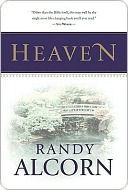More on this book
Community
Kindle Notes & Highlights
by
Randy Alcorn
Read between
August 19 - August 25, 2020
In the truest sense, Christian pilgrims have the best of both worlds. We have joy whenever this world reminds us of the next, and we take solace whenever it does not. Randy Alcorn
The New Jerusalem itself, also in the present Heaven, will be brought down, tree of life and all, and placed on the New Earth (Revelation 21:2). Just as the tree was apparently relocated from Eden to the present Heaven, it will be relocated again to the New Earth.
Some people read “you may participate in the divine nature” (2 Peter 1:4) and imagine that we will all become indistinguishable from God. But to imagine we’ll lose our personal identities is a Hindu belief, not a Christian one. The verse in 2 Peter means that we’re covered with Christ’s righteousness. We’ll participate in God’s holiness yet fully retain our God-crafted individuality.
At the very end of Mere Christianity, C. S. Lewis writes, “Until you have given up your self to Him you will not have a real self. Sameness is to be found most among the most ‘natural’ men, not among those who surrender to Christ. How monotonously alike all the great tyrants and conquerors have been: how gloriously different are the saints. . . . Nothing in you that has not died will ever be raised from the dead. Look for yourself, and you will find in the long run only hatred, loneliness, despair, rage, ruin, and decay. But look for Christ and you will find Him, and with Him everything else
...more
What prepares us to participate in God’s glory? Our current sufferings (Romans 8:17-18; 1 Peter 5:1-4). “For our light and momentary troubles are achieving for us an eternal glory that far outweighs them all” (2 Corinthians 4:17). Provided we draw our strength from Christ, the greater our troubles now, the greater our glory then.
Martin Luther said, “If God had all the answers in his right hand, and the struggle to reach those answers in his left, I would choose God’s left hand.” Why?
Donald Gray Barnhouse once said that if he was told he had three years left on Earth, he would spend two years studying and one preaching. Expressing a similar desire, Billy Graham said that if he had his life to do over again, he would study more and preach less.
Christian, meditate much on heaven, it will help thee to press on, and to forget the toil of the way. This vale of tears is but the pathway to the better country: this world of woe is but the stepping-stone to a world of bliss. And, after death, what cometh? What wonder-world will open upon our astonished sight? Charles Spurgeon
I have held many things in my hands, and I have lost them all. But whatever I have placed in God’s hands, that I still possess. Martin Luther
Babette’s Feast, through
In early Christian Greek tradition, Easter Monday was a “day of joy and laughter,” called Bright Monday.333 Only
Joni Eareckson Tada writes from her wheelchair, “I haven’t been cheated out of being a complete person—I’m just going through a forty-year delay, and God is with me even through that. Being ‘glorified’—I know the meaning of that now. It’s the time, after my death here, when I’ll be on my feet dancing.”338
If we’re Christians, we get two opportunities to live on Earth. This first one is but a dot. It begins, it ends. It’s brief. The second opportunity will be a line, extending on forever. We all live in the dot. But if we’re smart, we’ll be living for the line.340
When blind hymn writer Fanny Crosby wrote the lines “His glory we shall see” and “When our eyes behold the city,” her thoughts were all the more significant because her eyes had never seen anything. She’d tell people not to feel sorry for her because the first face she’d ever see would be Christ’s. Her sight was forever healed in 1915 when she died and left this world.
After Columbus discovered the New World, Spain struck coins with the Latin slogan Plus Ultra. It meant “More Beyond.” This was a horizon-expanding message to people who’d always believed the world they knew was all there was.
A. W. Tozer said, “In nature, everything moves in the direction of its hungers. In the spiritual world it is not otherwise. We gravitate toward our inward longing, provided of course that those longings are strong enough to move us.”
Life is not, as Macbeth supposed, “a tale told by an idiot, full of sound and fury, signifying nothing.”


